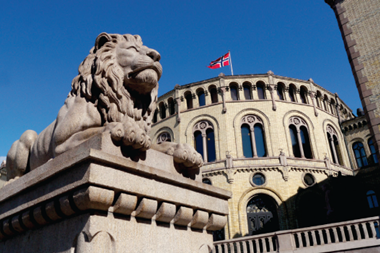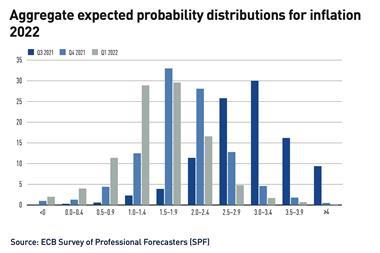Norway’s sovereign wealth fund is currently drawing up a plan to divest all its investments in Russia, but the fund’s leadership told a news conference this morning that the NOK27bn (€2.7bn) value of such assets at the start of the year has now dwindled to just a tenth of that – and they may essentially become worthless.
Norges Bank Investment Management (NBIM), which manages the currently NOK11.7trn Government Pension Fund Global (GPFG), held the media event this morning at its Oslo headquarters, to present its 2021 responsible investment report as well as to give a briefing on the current market situation.
Nicolai Tangen, NBIM’s chief executive officer, said: “We are seeing tragic pictures coming out of Ukraine, and it is impacting the market in a very significant way.”
At the beginning of the year, he said the GPFG had Russian shares at a value of roughly NOK27bn.
“What’s been going on in the stock markets has meant the value of the shares is significantly lower. We estimate that they are roughly at NOK2.5bn, but that’s also a very, very uncertain number,” the CEO said.
A slide of the SWF’s 10 largest Russian equity holdings showed that more than 60% of its investments in the country were in Gazprom, Lukoil and Sberbank.
On 25 February, the value of the fund’s Russia investments had already declined to NOK16.5bn, but have since gone on to lose most of that remaining value.
Deputy CEO Trond Grande said it was far too early to say how much the assets would be worth when sold.
“We are giving an estimate today with the input that we have of NOK2.5bn, but it’s very uncertain, and it might be that they are essentially worthless at some point,” he said.
He said NBIM would respond to the government’s letter instructing it to form a plan for divestment of the Russian assets by 15 March.
“I would like to emphasise that we are developing this plan under extreme uncertainty. Markets are essentially closed in Russia, there are multiple sanctions, meaning that we need to know how to best to sell those assets without violating the sanctions – and there is a lot of news coming out on a daily basis,” Grande said.
Details of the plan would probably not be made public, he added.
Roughly three quarters of the GPFG’s investments in Russia had been run by external managers, he said, adding that NBIM had now instructed both the internal management team and external managers that the assets were frozen.
Tangen said that since the fund had started the year with a relatively small proportion in Russian assets at 0.2% of the portfolio, these investments themselves had constituted a smaller part of the overall decline of the fund recorded so far this year.
“We are in the middle of a war. It has created some decline in the value of the fund. Whether it will continue, get bigger, I don’t know.”
Nicolai Tangen, NBIM’s CEO
“More important has been the impact on the overall global capital markets. As of yesterday, the fund was 6.1% down, compared to the positive 14.1% return last year,” he said.
As the SWF was roughly 70% invested in equities, stock markets were the most important factor for returns, Grande said, adding that equity markets were down 8% this year so far – a development that came against 20% gain on those markets last year.
Tangen said NBIM expected continued volatility in the markets.
“As a long-term investor we are used to volatility, of course, and we are sitting through it. We have to remember that over the last three years, the fund had positive returns of NOK4trn.”
Asked about the potential for further falls in the SWF’s value, Tangen said: “We are in the middle of a war. It has created some decline in the value of the fund. Whether it will continue, get bigger, I don’t know.”
Tangen says his Russian knowledge arguably didn’t help the SWF
Norway’s oil fund has a leader with considerable knowledge of Russia, but he candidly admits this expertise did not manage to save the fund from the billions of Russian investment losses that now seem certain to crystallise. Like most of the rest of the world, he did not see the war coming.
Nicolai Tangen, CEO of the Government Pension Fund Global’s (GPFG) manager Norges Bank Investment Management (NBIM), studied Russian at the Norwegian Armed Forces’ School of Intelligence and Security.
He lived in Moscow for six months back in 1989, working in the Norwegian embassy in the city as commercial attaché.
Asked in an interview this morning if being a Russian speaker, and having a military background, had put him in a good position to have more insight into the current situation that was useful for the fund, he told IPE: “I’m afraid that, based on where we are today, you could argue that it certainly hasn’t given me any particular insight because we still unfortunately have all the Russian shares.”
“I did a degree in Russian, I wrote my dissertation on Gorbachev’s speeches, but unfortunately that has not helped the fund,” he said.
While Norway’s SWF has been losing money due to the financial market reaction to the Ukraine crisis, the country is also the third-largest exporter of natural gas in the world, behind Russia and Qatar, at a time of surging gas prices.
Asked if this national diversification of wealth provided some comfort to Norwegians, Tangen said: “You know what? I think this is a human catastrophe of a dimension which is such that there is just no comfort anywhere in economics or revenue.
“Given the human disaster this is, I don’t take much comfort from the fact we get some extra revenues,” he said.
The latest digital edition of IPE’s magazine in now available





















